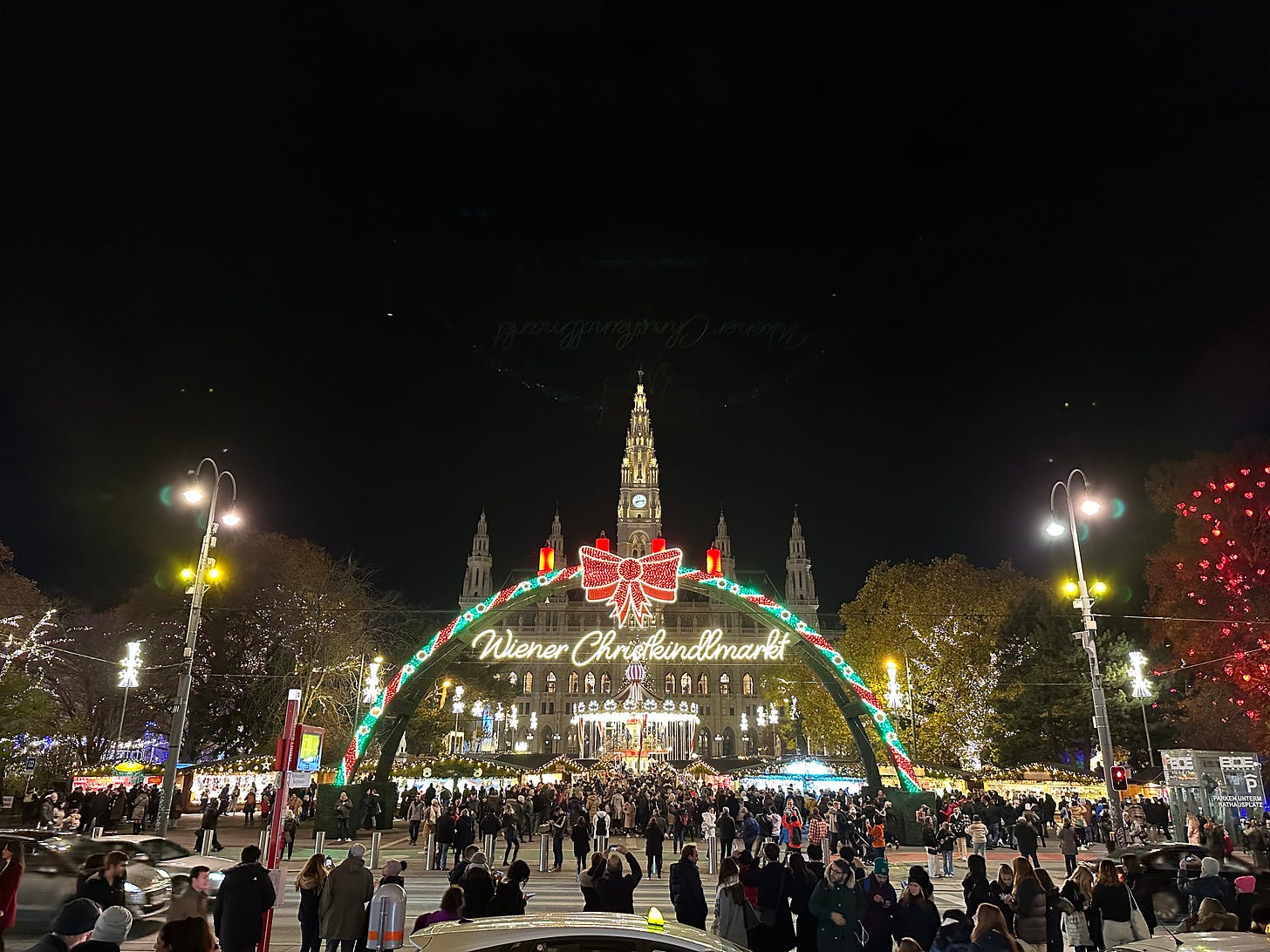Christmas… Christ’s Mass. This season, especially in the West, is a mix of pre-Christian, Christian, and secular traditions. It’s a time of spiritual reflection on the important foundations of the Christian faith and a celebration. It’s when Christians celebrate God’s love for the world through the birth of the Christ Child: Jesus.
Most traditions vary in significance and symbolic meaning. For example, we exchange gifts because God sent us the most precious gift: his only Son. Also, three Wisemen visited Jesus and brought gifts as well. Not to mention a poem titled A Visit from St. Nicholas, penned in 1822, that popularized the tradition of exchanging gifts too. (I’ll bet you’ll be shocked to know you’ve heard this poem many times throughout your life; and didn’t even know it!)
It should come as no surprise, that throughout my life, Christmas has taken on different meanings. As a child, it was an exciting time of year that meant toys and presents. It also, apart from being my dad’s birthday, was frustratingly the only day of the year he would sleep in… thus prolonging the gift exchange. Now, as an adult, it’s a time for celebrating and being close with family. And I remember the exact year that changed for me.
In 2008, my college choir was invited to perform in an international competition in Vienna, Austria. A small group of people were selected, and I was one of the privileged few that was asked to perform. During this trip - in November - we saw so many wonderful Christmas decorations, lights, churches… but the number one attraction, and what made me fall in love with Christmas, was the weihnachtsmarkt (Christmas Market), a street market, originated in Germany, associated with the celebration of Christmas during the four weeks of Advent.
These Christmas markets are decked out with rustic timber booths, draped with fragrant evergreen boughs, lining town squares, and it is here that vendors and artists sell items such as toys, blown-glass ornaments, cones of warm sugared almonds, and steaming mugs of Glühwein (spiced mulled wine) to holiday shoppers, accompanied by traditional singing and dancing.
A few years ago, in the Philadelphia Inquirer, there was a news story in which the Mayor of Philadelphia announced that the word “Christmas” would be removed from the city’s Christmas Village (their own, Americanized version of a weihnachtsmarkt). Arguments on both sides turned this into a heated debate… “Happy Holidays” versus “Merry Christmas,” resurfacing the longstanding notion that “we must keep Christ in Christmas”.
Keeping Christ in Christmas
In 2012, Barbara Reynolds wrote a piece for The Washington Post, titled “Keeping Christ in Christmas.”1 In her article, she shared her frustrations, and those of many Christians, that “as the nation has become more secular, certain spiritual values were tossed out the window. Too often, money or materialism became our god, what we worshipped. [And] Over the years, we suffered a moral meltdown from which we have yet to emerge.”
There are two kinds of light - the glow that illumines, and the glare that obscures.
- James Thurber -
I do agree with Ms. Reynolds in that Christmas has morphed into a string of sales, with ash-striped adults overcharging and overspending to keep up with the Joneses. Heck, I also agree with her emphasis on how extravagant gift giving to satisfy the wants or demands of spoiled children doesn’t give us what we really want - inner peace, love, and purpose that can come from spiritual blessing. However, when it comes to “keeping Christ in Christmas,” I have a different take; and one that aligns with Reverend Emily C. Heath.
Rev. Heath shared in a HuffPost post2 what she learned from her mother at eight years old: If someone is Christian, say “Merry Christmas”. If someone is Jewish, “Happy Hanukkah” is appropriate. And if you don’t know, “Happy Holidays” or “Happy New Year” always works. It’s about being polite, having good manners, and respecting the fact that religious beliefs are not shared by everyone.
Her hypothesis, regarding those Christians that are “livid” about the fact we no longer keep Christ in Christmas, and (in their perception anyway) no longer keep Christmas at center stage this time of year, is that we (Christians) did this to ourselves. We accepted the transformation of Advent from a time of holy watching and waiting, to one of hyper consumerism and cultural observances. And, to those that still believe Christmas is “under attack”, Rev. Heath suggests we look within, saying “it has come from those of us who claim our greatest hope comes from the fact that God became a person of goodness, kindness, justice, and love. And who then act nothing like that person did.”
And so, this season, perhaps we should worry less about the holiday policies of non-religious institutions, and worry more about whether we are listening to, and then doing, what Christ told us to do. In short, keeping Christ in Christmas by acting like Christians. But what if I told you Christ (the person) was never meant to be in Christmas (the day)?
Although people worldwide celebrate Christ’s birth on December 25th, it was likely that he was born on a different month and date. Most likely, the church in the 4th century chose December 25th as it coordinated with the Solstice on the Roman calendar.
Jesus’ Birthday: September, 2-3 BC
Several factors are involved in establishing the year of Christ’s birth. There were two dating systems at the time of Julius Caesar in 44 BC. One was the Julian Calendar, and the other began with the year Rome was established: 753 BC. Julius Caesar was also determined that a year would be calculated beginning with “the accession of absolute power by the then emperor.”
About 500 years later, a monk, Dionysius Exiguus, invented the concept of AD. His purpose was to establish when Easter should be celebrated by working backward using a complicated system of his own; deciding that Christ was born in AD 1, and his system was adopted in Europe around 200 years later.
Bible scholars work from what the scripture tells us regarding the history of Jesus. The events took place within the living memory of the writers of their families, such as the reign of Herod during which time, Matthew tells us Christ was born. We know there was a celestial event that alerted the Magi, and this can also be dated.
John the Baptist’s preaching took place during “the fifteenth year of the reign of Tiberius.” Jesus’ approximate age at the start of His ministry (30) is also supplied in the book of Luke, so we can determine that Christ was likely born around 2 or 3 BC. However, theologians typically agree that December 25th is far from likely.
One view is that when Roman Emperor Constantine converted to Christianity, it was easier for the newly formed church to repurpose the pagan observance of the winter solstice (between December 17-25) since citizens were already prepared to celebrate the day. This festival was a time of merrymaking where families and friends would exchange gifts… at Christmas, these traditions would continue.
Realistically, shepherds would not have been tending their flocks in December when the weather was cold; they would have continued shepherding no later than October. According to BibleInfo.com:
“We can approximate the month of Jesus’ birth to be around the time of Tishri (mid to late September). To arrive at this date, start at the conception of John the Baptist, Sivan (June), count forward six months to arrive at Gabriel’s announcement of the conception of Jesus, Kislev (December), then count forward nine months, the time it takes for human gestation, to reach Tishri (September), when Jesus was born.”
This, however, assumes each mother’s pregnancy went full-term… So, there is no definitive answer.
Are you ready?
As on the first day of creation, this Christmas Season the Word illumines the world, shining forth to bring all things into being. This season we celebrate the incarnate Word, God becoming flesh to live among us in the person of Jesus Christ then and now, emboldened by the good news of Christ’s birth, along with the shepherds, Mary and Joseph, and all witnesses to the light of Christ, we declare to the world that we have indeed seen and been transformed by the arrival of “the salvation of our God.”
Illumination is that special activity of the Holy Spirit by which man can recognize that what the Scripture teaches is true and can accept and appropriate its teaching. As we approach the end of the Advent Season in preparation for Christmas, journey with me as we remember its true meaning, that God became a person of goodness, kindness, justice and love.
https://www.washingtonpost.com/blogs/therootdc/post/keeping-christ-in-christmas/2012/12/20/44b48154-4a30-11e2-820e-17eefac2f939_blog.html
https://www.huffpost.com/entry/on-keeping-christ-in-chri_b_1152761





